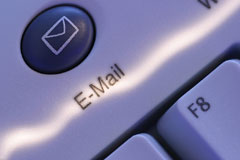Writing a Report
 In the last issue we looked at preparing to write a report. If you have been following all the tips in that issue, you are now ready to write your report! To write well, use plain English and adopt the ABC's of writing: be accurate, be brief and be clear. There is no point investing time and effort in your report only to have your readers lay it aside or ignore it because they find it full of jargon, difficult to read or badly laid out. So here are top ten tips for writing a report:
In the last issue we looked at preparing to write a report. If you have been following all the tips in that issue, you are now ready to write your report! To write well, use plain English and adopt the ABC's of writing: be accurate, be brief and be clear. There is no point investing time and effort in your report only to have your readers lay it aside or ignore it because they find it full of jargon, difficult to read or badly laid out. So here are top ten tips for writing a report:
1. Be accurate by checking the spelling, grammar and punctuation. Also check all your facts and figures. For example, check that columns add up, or that your survey results haven’t been superseded by the time you come to compile your report.


 further your career, since people see not only the content and well reasoned arguments or recommendations, but also the confidence and clarity with which it is written.
further your career, since people see not only the content and well reasoned arguments or recommendations, but also the confidence and clarity with which it is written. The phone is constantly engaged. The taxi ignores you. Your train is late. Why do minor hassles like these have the potential to make us uptight? Maybe it's because we're tightly wound already and can't find the pressure relief valve. We all live and work in a pressured world - pressure over money, commuting, technology, looking good, eating well. Balancing the pressures of home life and work life are vital if we are to get optimum amounts of the adrenaline buzz to stay healthy and enjoy the whole life! So here are the top ten tips for when the going gets tough:
The phone is constantly engaged. The taxi ignores you. Your train is late. Why do minor hassles like these have the potential to make us uptight? Maybe it's because we're tightly wound already and can't find the pressure relief valve. We all live and work in a pressured world - pressure over money, commuting, technology, looking good, eating well. Balancing the pressures of home life and work life are vital if we are to get optimum amounts of the adrenaline buzz to stay healthy and enjoy the whole life! So here are the top ten tips for when the going gets tough: reactions and behaviours we employ now are the result of years of fine tuning. Being assertive doesn’t happen overnight, but the more practice you get, the more skilled you become. And while you may not always get what you want, you will always know you gave it your best. So here are the top ten tips for improving your assertive behaviour:
reactions and behaviours we employ now are the result of years of fine tuning. Being assertive doesn’t happen overnight, but the more practice you get, the more skilled you become. And while you may not always get what you want, you will always know you gave it your best. So here are the top ten tips for improving your assertive behaviour: In order to use valuable time effectively during a meeting it is crucial that you have a well-prepared agenda. An agenda helps the chairperson to stick to time and lead the meeting successfully. It also helps participants to prepare as they can see when they will be involved. Finally, it is of great benefit to the minute taker as they can see what will be discussed, the aim of each item and the priority given to it.
In order to use valuable time effectively during a meeting it is crucial that you have a well-prepared agenda. An agenda helps the chairperson to stick to time and lead the meeting successfully. It also helps participants to prepare as they can see when they will be involved. Finally, it is of great benefit to the minute taker as they can see what will be discussed, the aim of each item and the priority given to it. great resolutions and to not break them for once. It always seems to happen, you come up with a great list:
great resolutions and to not break them for once. It always seems to happen, you come up with a great list: belittling phrases when they are frustrated, under pressure themselves, or don’t feel things are being done quickly enough. This especially happens at the telephone where a caller’s verbal attack can be highly offensive and may overstep acceptable and manageable boundaries of anger. So here are the top ten tips for handling verbal aggression on the telephone:
belittling phrases when they are frustrated, under pressure themselves, or don’t feel things are being done quickly enough. This especially happens at the telephone where a caller’s verbal attack can be highly offensive and may overstep acceptable and manageable boundaries of anger. So here are the top ten tips for handling verbal aggression on the telephone: However, life isn't perfect. People who work hard and are loyal can be overlooked for promotion or pay rises – while those doing a good PR job on themselves tend to be thanked and appreciated more often.
However, life isn't perfect. People who work hard and are loyal can be overlooked for promotion or pay rises – while those doing a good PR job on themselves tend to be thanked and appreciated more often. How to build a productive and mutually beneficial relationship with your manager
How to build a productive and mutually beneficial relationship with your manager just about anybody. However, one of its biggest challenges is that we think we can write quickly and easily without checking. As a result, our e-mail is often badly composed, too long or too brief, contains spelling and grammatical errors and even goes to the wrong person if we pressed the wrong button too quickly!
just about anybody. However, one of its biggest challenges is that we think we can write quickly and easily without checking. As a result, our e-mail is often badly composed, too long or too brief, contains spelling and grammatical errors and even goes to the wrong person if we pressed the wrong button too quickly!